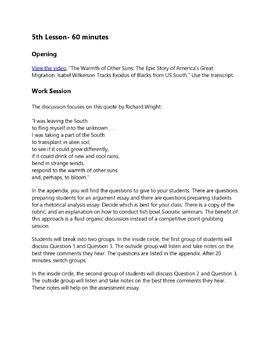
This fact seems quaint to black children born in integrated circumstances after the major struggles of the civil rights movement had been decided, but people my age and older remember well the rituals Wilkerson describes when migrants returned to their hometowns to visit: The routes were carefully plotted so overnight stays could be made with relatives or close family friends, because hotels below the Mason-Dixon Line (and sometimes above) refused black visitors. Before World War I, 90 percent of the country’s blacks lived in the South.

The Great Migration affected almost every black person with American roots: No matter where we were born and raised, almost all of us had our beginnings somewhere in the South. How the three got to their respective Northern meccas, what they gave up to remain there and what they got in return is the most American of stories. Despite that, they were routinely pushed to the bottom of the socioeconomic ladder where ABC - Anybody But Colored - was too often the rule.Īuthor Interviews Great Migration: The African-American Exodus North Theoretically, they possessed the freedoms their European brethren were seeking. Both were huddled masses, yearning to breathe free, with one critical difference: black migrants were already citizens. Ironically, the early black migrants were converging on the interior Ellis Islands of the North and Midwest (New York, Chicago, Detroit, Milwaukee, Pittsburgh, etc.), just as oppressed Europeans were converging on the same cities. They’re all reflected in The Warmth of Other Suns, Wilkerson’s sweeping history of the Great Migration.Īs Wilkerson notes, America’s greatest domestic movement began around 1917 and ended in 1975, an epoch during which millions of black American citizens fled Southern towns and cities, with their elaborate and complicated tapestries of Jim Crow laws, for the relative freedoms of the north. The exits occurred for various reasons: the desire to escape the near-starvation of tenant farmer existences the need to leave because their own prospects were so restricted, and they wanted more for their children the middle of the night departures because a son had not been deferential enough to an outraged white townsman the vaporization of an entire family overnight, because their pretty eldest daughter had attracted the lingering glance of a white man she would not be allowed to refuse, with dire consequences to her entire family.

Reading Isabel Wilkerson is like hearing the stories of my parents’ friends and their parents, the handed-down (and often sanitized) tales of their exodus from the South. The Warmth of Other Suns: The Epic Story of America’s Great Migration


 0 kommentar(er)
0 kommentar(er)
